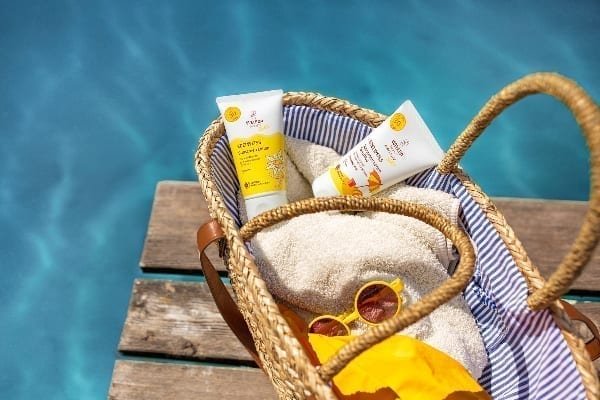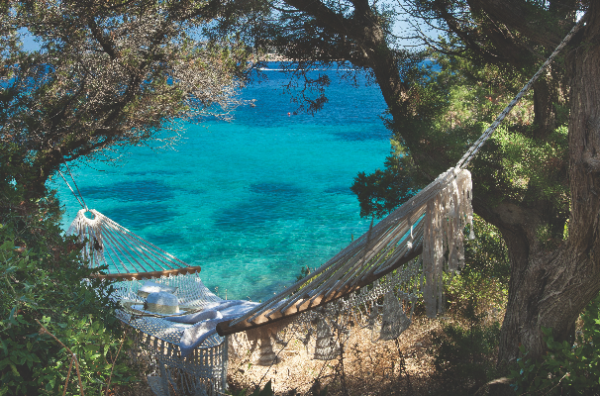Unprotected exposure to UVA and UVB causes sunburn and could lead to serious health problems, such as skin cancer. In addition, as UVA can contribute to accelerated or premature skin ageing (photoageing), sun protection is vital for the health of our body.
During the summer months the sun is higher in the sky, increasing our skin’s daily dose of harmful UV light. Sun protection is particularly important for children as they are more sensitive to sun damage than adults.
Hana Musinovic, regulatory & scientific officer at NATRUE (the international Natural and Organic Cosmetics Association and certification body), has put together this advice to help you find the right sunscreen, wherever you plan to travel this summer.
Which sunscreens are best?
To protect us, sunscreens include UV-filters. These work either by absorbing and changing the UV light, which is the case for artificial sunscreens, or by reflecting and scattering the UV light, which is how mineral sunscreens work.
Two mineral sunscreens are permitted by the NATRUE criteria as these substances occur in nature. The two permitted UV filters are zinc oxide and titanium oxide, which are classified as nature-identical substances. NATRUE allows for nature-identical ingredients to be used in cosmetic formulations when the natural raw material is problematic and the nature-identical material can be made without harm to us or to the planet.
Although they do exist in nature, sourcing minerals from the earth and rock is often fraught with difficulty. Quality is an issue, as there may be contaminates and impurities in the ground. This is a particular concern if the minerals are contaminated with unacceptable levels of heavy metals.
Safety is also often an issue for the miners. Protecting the landscape from the devastating impact of mining on the landscape is also another reason. Therefore NATRUE allows nature-identical copies of mineral ingredients, because this guarantees greater purity and safety for the consumer. These pigments can be found in nature but are reproduced under strict laboratory conditions to ensure quality standards for the finished product.
Mineral sunscreens with nano particles
Nano particles do exist in nature. They are just very tiny particles of substances. You’ll find nano particles of silica in sand on the beach, for example. For this reason the NATRUE standard permits nano forms of zinc oxide and titanium oxide.
Both nano and non-nano forms of zinc oxide and titanium oxide are approved by law in accordance with certain restrictions, for instance their purity and maximum concentration in finished products. Both zinc oxide and titanium oxide in nano and non-nano forms have received positive review from the European Commission’s Scientific Committee on Consumer Safety (SCCS) as part of their independent safety assessment.
In the EU, claims on cosmetic products have to meet six common criteria. The claim ‘nano free’ or ‘free from nano’ would have to be evidentially supported in order to not be misleading to consumers (that is, to substantiate that no nanomaterials whatsoever were in the formulation).
Even if the majority of the intentionally manufactured UV-filters were in non-nano form, there could be some particles, even if unintentionally present, that would be considered nano in size.
Consumers are notably cautious about nanomaterials, and to this end for consumer notification it remains the law for all manufacturers of finished products when intentionally using nanoscale ingredients that these must be labelled using their INCI name followed by ‘nano’ in brackets.
Sunscreens to avoid
Some Caribbean islands and other mainland holiday destinations in the Pacific ocean have taken precautionary measures to ban some synthetic sunscreens over concerns for their potential risk to marine life. For instance from 01 January 2021, the state of Hawaii will ban the sale or distribution of sunscreens containing oxybenzone and octinoxate on its beaches, while the state of Palau will ban from 01 January 2020 the sale and use of sunscreen products that contain oxybenzone, ethyl paraben, octinoxate, butyl paraben, octocrylene, 4-methylbenzlidene camphor, benzyl paraben, tricolosan, methyl paraben or phenoxyethanol.
Other regions that are introducing similar measures include Bonaire, Miami and Key West Florida, plus several Mexican resorts.
 Play Video about This Rock Might Just Save The World
Play Video about This Rock Might Just Save The World Play Video about Play 2 hours of rock
Play Video about Play 2 hours of rock Play Video about Play 2 hours of brook
Play Video about Play 2 hours of brook Play Video about Play 2 hours of sheep
Play Video about Play 2 hours of sheep










































